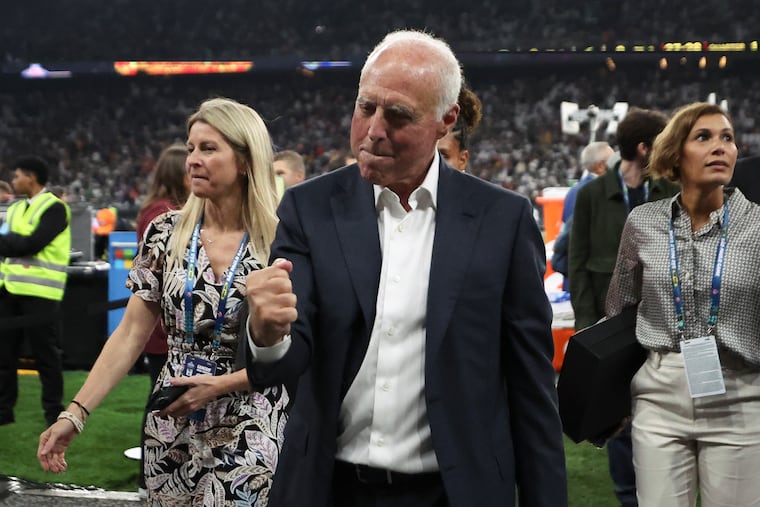Eagles owner Jeffrey Lurie is in talks to sell a minority stake in the team, Bloomberg News reports
Susan Kim is on the board of Amkor Technology Inc. and is a philanthropist who sits on the board of directors of the Catholic Foundation of Greater Philadelphia.

Eagles owner Jeffrey Lurie is in talks to sell a minority share of Philadelphia’s NFL team to the family of technology titan Susan Y. Kim, Bloomberg News reported Wednesday, citing people with knowledge of the matter.
A transaction has not been finalized but would value the team at $8 billion or more. The sales of interests in NFL teams require league approval, and it’s possible that the talks could collapse or that other suitors could emerge, Bloomberg said.
A spokesperson for the Eagles said the team had no comment on the Bloomberg report.
Kim will succeed her father, James Kim, as the executive chairman of Amkor Technology Inc. on Thursday, the company said earlier. James Kim founded Amkor’s predecessor, Amkor Electronics, in 1968.
The family owns 50.2% of Amkor Technology, which has a market capitalization of about $6.8 billion, according to data compiled by Bloomberg. James Kim also founded Electronics Boutique Holdings Corp., which was acquired by GameStop Corp. in 2005 for roughly $1.4 billion, Bloomberg reported.
Susan Kim was elected to the board of directors of Amkor Technology in 2015 and currently serves as executive vice chairperson.
She is a philanthropist who sits on the board of directors of the Catholic Foundation of Greater Philadelphia and in the past has served on the boards of organizations including the National Constitution Center, the Philadelphia Orchestra, the Franklin Institute, the Gesu School, and the Shipley School, according to her Amkor biography.
She lives in Bryn Mawr, according to the Catholic Foundation website.
Bloomberg reported in June that Lurie was exploring the sale of a minority stake in the Eagles.
Lurie, 73, has a net worth of $6.1 billion, according to the Bloomberg Billionaires Index. He has controlled the franchise since 1994, when he acquired the Eagles from Norman Braman for a reported $185 million, a record for a sports team at the time.
The gain to Lurie by selling an interest would be the acquisition of cash, a sports economist earlier told The Inquirer. Even a smaller investor can spend tens or hundreds of millions of dollars to own part of a team.
That money could go many places.
It could help Lurie diversify his investment portfolio. Unlike some pro sports owners who grew rich in real estate or tech and hold a team as just one of their assets, Lurie’s main interest and job is running the Eagles.
It’s also possible that some or all of that multimillion-dollar infusion could be spent on the team itself.
Purchasing part of the team is attractive because it’s a reliable investment, given that the values of professional sports teams continue to accelerate.
Part-owners also get status and in some cases perks that include luxury seating and on-field access. Perhaps most of all, investors can learn about running a team to position themselves as a potential owner.